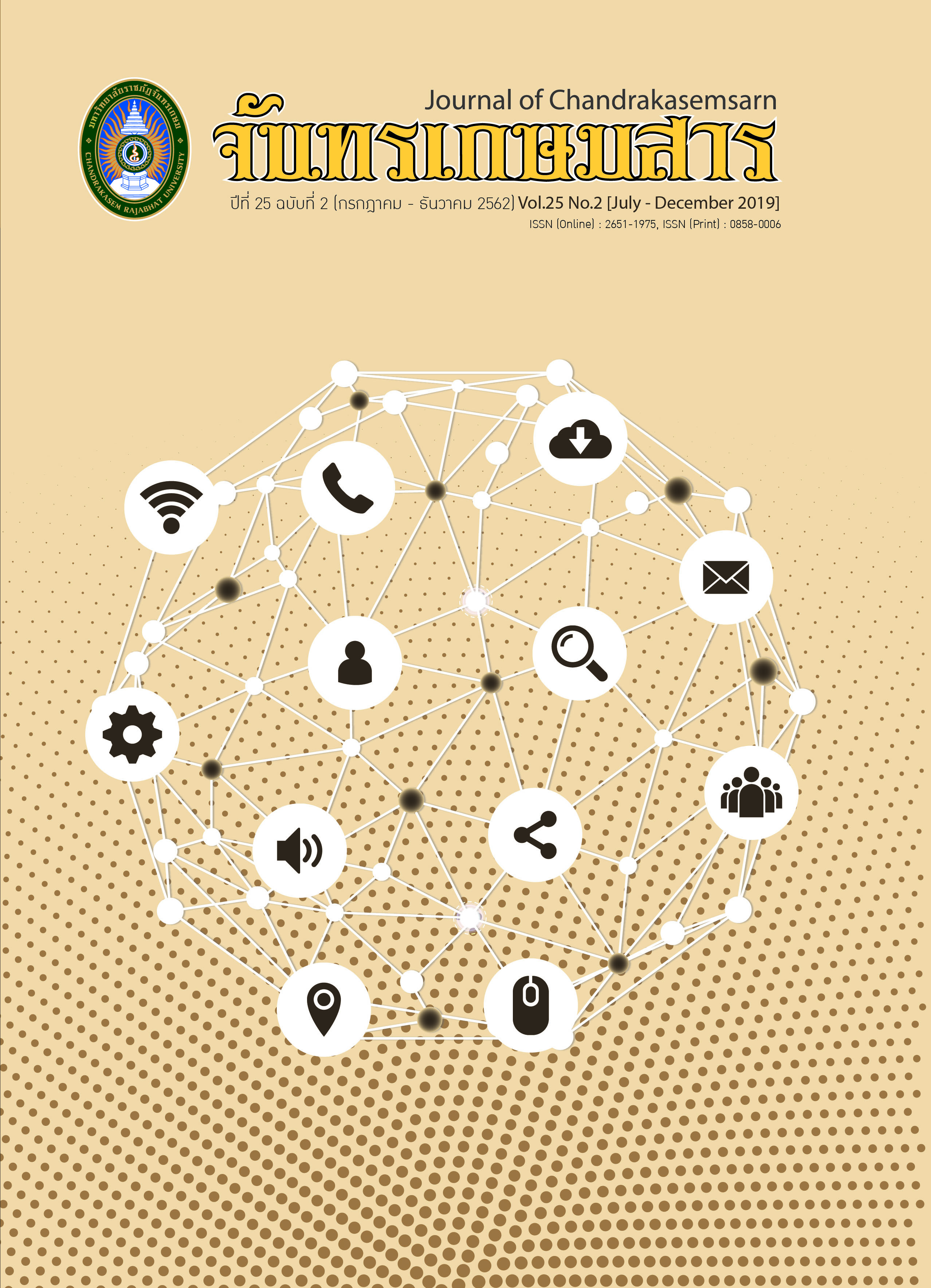ปัจจัยที่มีความสัมพันธ์ต่อการปฏิสัมพันธ์ทางสังคมเพื่อการปรับตัวผ่านเฟซบุ๊กของชาวต่างชาติในประเทศไทย
คำสำคัญ:
การใช้เฟซบุ๊ก, การแสวงหาสารสนเทศ, การปฏิสัมพันธ์ทางสังคม, การปรับตัวบทคัดย่อ
การวิจัยครั้งนี้มีวัตถุประสงค์เพื่อ 1) ศึกษาลักษณะประชากร ความยาวนานในการพักอาศัย ความสามารถทางภาษาไทย พฤติกรรมการใช้เฟซบุ๊ก การแสวงหาสารสนเทศผ่านเฟซบุ๊กและ การปฏิสัมพันธ์ทางสังคมเพื่อการปรับตัวผ่านเฟซบุ๊กของชาวต่างชาติในประเทศไทย 2) ศึกษา ความแตกต่างระหว่างลักษณะประชากร ความยาวนานในการพักอาศัย ความสามารถทาง ภาษาไทย พฤติกรรมการใช้เฟซบุ๊ก การแสวงหาสารสนเทศผ่านเฟซบุ๊ก และ การปฏิสัมพันธ์ทาง สังคมเพื่อการปรับตัวผ่านเฟซบุ๊ก ด้วยการสำรวจออนไลน์ชาวต่างชาติที่พักอาศัยในประเทศไทย จำนวน 340 คน การวิจัยครั้งนี้เป็นการวิจัยเชิงปริมาณโดยใช้สถิติ t-test และ One-way ANOVA ในการทดสอบสมมติฐาน ผลการวิจัย พบว่า 1) ชาวต่างชาติในการวิจัยครั้งนี้ประกอบด้วยเพศชาย 204 (60%) คน และ เพศหญิง 136 (40%) คน 2) ส่วนใหญ่มีอายุระหว่าง 23-40 ปี (54.1%) 3) เดินทางมา จากทวีปเอเชียมากที่สุด (35.6%) 4) มีความยาวนานในการพักอาศัย มากกว่า 5 ปี (37.4%) 5) มีความสามารถทางภาษาไทยในระดับน้อย (= 2.03 และ SD = .998) 6) มีพฤติกรรมการใช้ เฟซบุ๊กในระดับระดับมาก (
= 3.99 และ SD = .597) 7) มีการแสวงหาสารสนเทศผ่านเฟซบุ๊ก ในระดับปานกลาง (
= 2.78 และ SD = .728) และ 8) มีการปฏิสัมพันธ์ทางสังคมเพื่อ การปรับตัวผ่านเฟซบุ๊กในระดับปานกลาง (
= 3.12 และ SD = .724) ผลการทดสอบสมมติฐาน พบว่า 1) เพศ อายุ และทวีปที่มาของชาวต่างชาติที่แตกต่างกันมีการปฏิสัมพันธ์ทางสังคม เพื่อการปรับตัวผ่านเฟซบุ๊กไม่แตกต่างกัน 2) ความยาวนานในการพักอาศัย และความสามารถ ทางภาษาไทยของชาวต่างชาติที่แตกต่างกันมีการปฏิสัมพันธ์ทางสังคมเพื่อการปรับตัวผ่าน เฟซบุ๊กไม่แตกต่างกัน และ 3) พฤติกรรมการใช้เฟซบุ๊ก และการแสวงหาสารสนเทศผ่านเฟซบุ๊ก ของชาวต่างชาติที่แตกต่างกันมีการปฏิสัมพันธ์ทางสังคมเพื่อการปรับตัวผ่านเฟซบุ๊กแตกต่างกัน
Downloads
เอกสารอ้างอิง
พัชนี เชยจรรยา. (2558). การวิจัยเชิงปริมาณทางนิเทศศาสตร์. กรุงเทพมหานคร: สำนักพิมพ์มหาวิทยาลัยสุโขทัยธรรมาธิราช.
สำนักงานพัฒนาธุรกรรมทางอิเล็กทรอนิกส์. (2560). รายงานผลการสำรวจพฤติกรรมผู้ใช้ อินเทอร์เน็ตในประเทศไทย. กรุงเทพมหานคร: สำนักงานพัฒนาธุรกรรมทางอิเล็กทรอนิกส์.
สุทิติ ขัตติยะและวิไลลักษณ์ สุวจิตตานนท์. (2554). แบบแผนการวิจัยและสถิติ. กรุงเทพมหานคร: สำนักพิมพ์เปเปอร์เฮ้าส์.
โอฬาริก ขุนสิทธิ์. (2555). การสื่อสารและการปรับตัวทางวัฒนธรรมของบุคลากรไทยในบริษัทสาขาประจำประเทศเพื่อนบ้าน (วิทยานิพนธ์นิเทศศาสตรมหาบัณฑิต). กรุงเทพฯ: จุฬาลงกรณ์มหาวิทยาลัย.
Appadurai, A. (1996). Modernity at Large: Cultural Dimensions of Globalization. Minneapolis: University of Minnesota Press.
Asghar, H. M. (2015). Measuring Information Seeking through Facebook: Scale Development and Initial Evidence of Information Seeking in Facebook Scale (ISFS). Computers in Human Behavior, 52, 259–270.
Bangkok Post. (2017). Thai Firms Lead Region for Clever Use of Social Media. Retrieved May 2, 2017, from www.bangkokpost.com/tech/local-news/977249/thai-firms-lead-region-for-clever-use-of-social-media.
Berry, J. W. (1997). Immigration, Acculturation and Adaptation. Applied Psychology: An International Review, 46(1), 5–68.
Boyd, D. M., & Ellison, N. B. (2008). Social Network Sites: Definition, History and Scholarship. Journal of Computer-Mediated Communication, 13(1), 1-23.
Büchi, M., Just, N., & Latzer, M. (2015). Modeling the Second-level Digital Divide: A Five-country Study of Social Differences in Internet Use. New Media and Society, 18(11), 1-20.
Chen, W. (2015). Mediatizing the Network Model of Cultural Capital: Network Diversity, Media Use, and Cultural Knowledge Along and Across Ethnic Boundaries. Social Networks, 40, 185-196.
Cochrane, S. (2010). A Comparative Study on Sociocultural Adaptation of Foreign Students on International Programmes at Faffles Design Institute (Unpublished master's thesis). Bangkok: King Mongkut’s University of Technology North Bangkok.
Cronbach, L. J., & Shavelson, R. J. (2004). My Current Thoughts on Coefficient Alpha and Successor Procedures. Educational and Psychological Measurement, 64(3), 391-418.
Facebook. (2017). Facebook Discussion Group. Retrieved August 20, 2017, from www.facebook.com
Forbush, E., & Foucault-Welles, B. (2016). Social Media Use and Adaptation among Chinese Students Beginning to Studay in the United States. International Journal of Intercultural Relations, 50, 1-12.
Hendrickson, B., Rosen, D., & Aune, R. K. (2011). An Analysis of Friendship Networks, Social Connectedness, Homesickness, and Satisfaction Levels of International Students. International Journal of Intercultural Relations, 35, 281–295.
Howard, R. W. (2008). Western Retirees in Thailand: Motives, Experiences, Wellbeing, Assimilation and Future Needs. Ageing and Society, 28, 145-163.
Internations. (2017). Expat Insider: The World Through Expat Eyes. Retrieved May 2, 2017, from https://www.internations.org/expat-insider/2017.
Kaplan, A. M., & Haenlei, M. (2010). Users of the World, Unite! The Challenges and Opportunities of Social Media. Business Horizons, 53(1), 59–68.
Kim, K.-H., Yun, H., & Yoon, Y. (2009). The Internet as a Facilitator of Cultural Hybridization and Interpersonal Relationship Management for Asian International Students in South Korea. Asian Journal of Communication, 19(2), 152–169.
Kim, Y. Y. (2001). Becoming Intercultural: An Integrative Theory of Communication and Cross-Cultural Adaptation. London: SAGE.
McEwan, B., Fletcher, J., Eden, J., & Sumner, E. (2014). Development and Validation of a Facebook Relational Maintenance Measure. Communication Methods and Measures, 8(4), 244–263.
Rattanasimakul, K. (2015). The Uses and Gratification of Facebook among Adolescents, Working Age and Elderly. Journal of Publica Relations and Advertising, 8(1), 14–20.
Rovinelli, R. J., & Hambleton, R. K. (1976). On the Use of Content Specialists in the Assessment of Criterion-Referenced Test Item Validity. 60th Annual Meeting of the American Educational Research Association (pp. 19-23). California: ERIC.
Sam, D. L., & Berry, J. W. (1995). Acculturative Stress among Young Immigrants in Norway. Scandinavian Journal of Psychology, 10–24.
Sawyer, R. (2011). The Impact of New Social Media on Intercultural Adaptation. Senior Honors Projects, University of Rhode Island.
Shafaei, A., Razak, N. A., & Nejati, M. (2016). Integrating Two Cultures Successfully: Factors Influencing Acculturation Attitude of International Postgraduate Students in Malaysia. Journal of Research in International Education, 15(2), 1–18.
Shuter, R. (2012). Intercultural New Media Studies: The Next Frontier in Intercultural Communication. Journal of Intercultural Communication Research. Special Issue: Intercultural New Media Studies, 41(3), 219-237.
Spitzberg, B. H. (2006). Preliminary Development of a Model and Measure of Computer-Mediated Communication (CMC) Competence. Journal of Computer-Mediated Communication, 11, 629–666.
Thompson, J. (1995). The Media and Modernity: A Social Theory of the Media. Cambridge: Polity Press.
Toh, S. M., & DeNisi, A. S. (2007). Host Country Nationals as Socializing Agents: A Social Identity Approach. Journal of Organizational Behavior, 28(3), 281–301.
Ward, C., & Rana-Deuba, A. (2000). Home and Host Culture influences on Sojourner Adjustment. International Journal of Intercultural Relations, 24(3), 291–306.
We Are Social. (2017). Digital in 2017: Global Overview. Retrieved May 18, 2017, from https://wearesocial.com/special-reports/digital-in-2017-global-overview
Wilson, T. D. (1999). Models in Information Behaviour Research. Journal of Documentation, 55(3), 249-270.
Woldeab, D. (2013). The Relationships between Internet Usage and Acculturation of the Horn of Africa Immigrants in the United States (Unpublished doctoral dissertation). Minneapolis: University of Minnesota.
Yamane, T. (1967). Statistics, An Introductory Analysis (2 ed.). New York: Harper and Row.
Ye, J. (2006). An Examination of Acculturative Stress, Interpersonal Social Support, and Use of Online Ethnic Social Groups among Chinese International Students. Howard Journal of Communications, 17(1), 1-20.
ดาวน์โหลด
เผยแพร่แล้ว
รูปแบบการอ้างอิง
ฉบับ
ประเภทบทความ
สัญญาอนุญาต
บทความที่ได้รับการตีพิมพ์เป็นลิขสิทธิ์ของมหาวิทยาลัยราชภัฏจันทรเกษม
ข้อความที่ปรากฏในบทความแต่ละเรื่องในวารสารวิชาการเล่มนี้เป็นความคิดเห็นส่วนตัวของผู้เขียนแต่ละท่านไม่เกี่ยวข้องกับมหาวิทยาลัยราชภัฎจันทรเกษม และคณาจารย์ท่านอื่นๆในมหาวิทยาลัยฯ แต่อย่างใด ความรับผิดชอบองค์ประกอบทั้งหมดของบทความแต่ละเรื่องเป็นของผู้เขียนแต่ละท่าน หากมีความผิดพลาดใดๆ ผู้เขียนแต่ละท่านจะรับผิดชอบบทความของตนเองแต่ผู้เดียว







